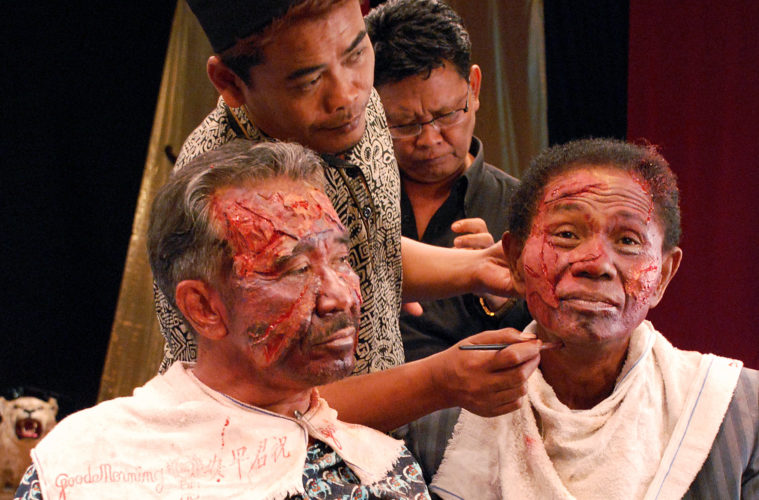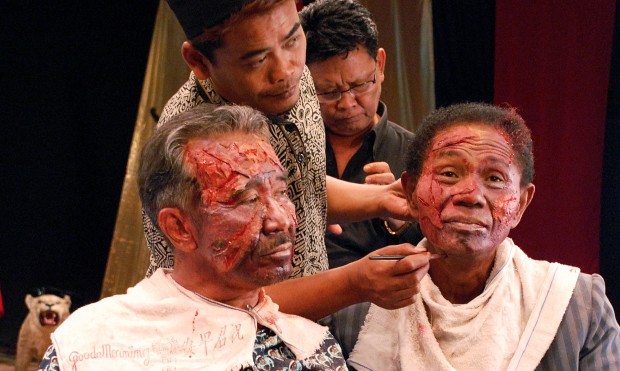
Placing high on our top 50 films of 2013, Joshua Oppenheimer‘s The Act of Killing is a deeply unsettling exploration of the mass killings reenacted by Indonesian death-squad leaders. With the documentary recently nominated for an Oscar and released on Blu-ray and Netflix, we took the time to review the film on our recent podcast. Now its director and producers, Errol Morris and Werner Herzog, have gathered for a fascinating Reddit AMA and we’ve rounded up the highlights.
Herzog, who is currently in production on Queen of the Desert, opened up about the state of the film industry, his thoughts on online piracy, film school, why he joined Jack Reacher, and much more. Morris revealed that Criterion is planning to release more of his films, as well as the casting of Bryan Cranston and Edgar Ramirez in his next feature (more on that here), while Oppenheimer greatly expanded on the aftermath of his film, his current relationship with Anwar and more.
However, that’s simply touching the surface, so one can read some of our favorite responses below and head over to the AMA for more as we look forward to the trio reteaming on an Act of Killing follow-up.
On how Herzog decides between narrative film and documentary, and how he chooses his next project:
For me it’s all just movies, and the borderline is blurred on either side of the fence. My next project is always the one that comes swinging most wildly at me in the middle of the night. -WH
Oppenheimer on the effect of the film in Indonesia:
Shortly after the film premiered Indonesia’s leading news magazine, Tempo, published special double edition inspired by the film, breaking a 47 year silence on the genocide. They sent journalists all over the country and found that everywhere the killers were boastful. They published 75 pages of killers’ boasting, showing that the film was a repeatable experiment and could have been made anywhere in Indonesia. – JO
Herzog on whether he relates to his characters:
For God’s sake, I shall never circle around my own navel in a movie. My caveat is that anyone looking at my films has to make a clear distinction between filmmaker and his invented characters and stories. -WH
Herzog on if he’d work with Nicolas Cage again:
Any project with Nic Cage as long as he naturally fits in, in any of my new stories. I simply want to work with the best of the best. -WH
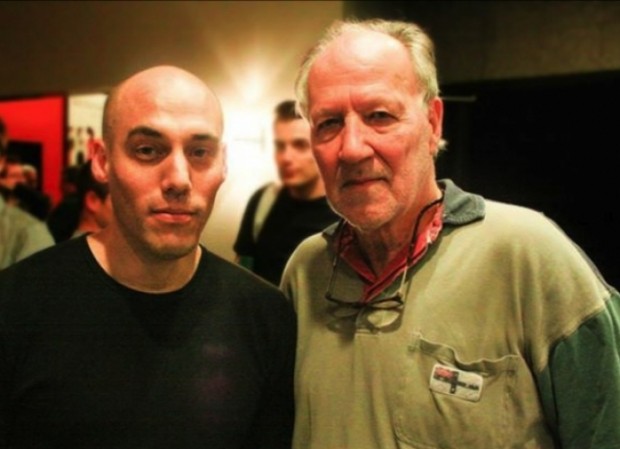 Herzog on using iguanas in Bad Lieutenant:
Herzog on using iguanas in Bad Lieutenant:
They were not in the screenplay, but I loved their weirdness. There’s nothing better in one shot together, than Nicolas Cage and an iguana. -WH
Herzog on his favorite animals to work with:
Recently, I work daily with camels and they have become very dear to my heart. -WH
Herzog on currently filming Queen of the Desert:
I am filming right now, in Morocco, and I am always, like in a tunnel, so focused that in the afternoon, I have to ask continuity what we shot in the morning. It’s a singular focus on the moment itself. -WH
Herzog on if he saw all the footage in Grizzly Man:
I never had time to watch all of his footage because I had to deliver the final cut of “Grizzly Man” after 9 days of editing. -WH
Herzog on if he felt close to death listening to the tapes in Grizzly Man:
There are things that should never enter a film, as there is the dignity and privacy of a human being’s death. -WH
Herzog on why he joined Jack Reacher:
They needed someone who would be frightening on screen before he even spoke. Naturally, I qualified. -WH
Herzog on the current state of the film industry:
Forget about the film industry. Forget about television. For $10,000 you can make a full-length feature film nowadays. I don’t like the culture of complaint. Just go out and do what you have to do, there are no excuses. -WH
Herzog on online piracy:
New forms of online distribution are emerging strongly. They will make piracy mostly obsolete. -WH
Herzog on film schools:
Stay away from film schools as long as you can. Avoid the theoretical approach of film studies; they are the enemy of the life of cinema. If you travel on foot for 2,000 miles, you will have learned more for movie-making than in four years of film school. -WH
Herzog and Oppenheimer on when they know a film is great:
You know it at once, instantly. When I saw eight minutes of random footage that Joshua Oppenheimer showed me on his laptop, I knew right away that The Act of Killing was a film I had never seen before, and would never see again in my life. -WH
A great film keeps you constantly gasping in surprise, delight, and amazement – a physical reaction that measures the degree to which we are finally seeing something we’ve longed to see, but didn’t know could exist. – JO
Morris and Herzog when asked about their favorite 2013 films:
I don’t really like movies. I just watch them and make them. -EM
You have to look beyond 2013. The Act of Killing will last for decades. -WH
Morris and Oppenheimer on their favorite films:
How about my favorite documentary films? Aguirre, the Wrath of God. (Let’s make a documentary about Klaus Kinski in the Amazon.) The Emperor’s Naked Army Marches On. (The dream interview, where the interviewer physically assaults the subject.) The Act of Killing. (What’s it like to kill people and never be held accountable for your crimes?)
-EMWerner’s Stroyzek and Even Dwarves Started Small. Errol’s Gates of Heaven Kiarostami’s Close Up Tsai Ming Liang’s The Hole Orson Welles’s The Trial (which I’ve only seen once but dream about to this day.) Kidlat Tahimik’s Perfumed Nightmare Ulrich Seidl’s Loss Is To Be Expected. I’ll stop there, because the list – JO
Oppenheimer on the best narrative directors:
Here are some: Mania Akbari, Edwin (his whole name), Daniel Hoesl, and some established ones: Werner Herzog (two new narrative films coming soon, both full of promise), Tsai Ming-Liang, Ulrich Seidl. – JO
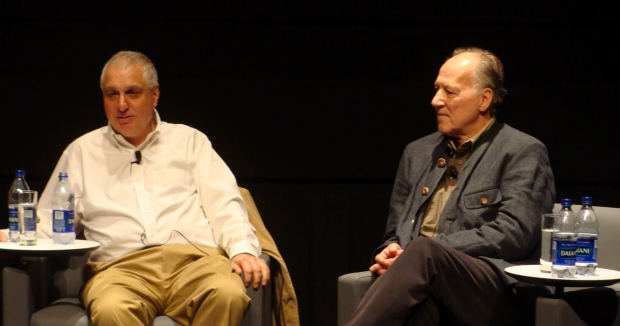
Morris when asked about what superhero movie he would do:
Many people think you’re supposed to make movies about heroes. I prefer pariahs. Indeed, I’ve never met a pariah I didn’t like. -EM
Herzog when asked what documentaries aspiring filmmakers should see:
More important, for an aspiring filmmaker, is reading. Read, read, read, read, read, read, read. If you don’t read, you’ll never make a great film. Not just blogs and Twitter, etc. If you do not read books, you’ll never develop a sense of story, rhythm, characters. Start with poetry like the Georgics of Virgil and go from there, all the way to Joseph Conrad and the Warren Commission Report on the assassination of Kennedy. -WH
Oppenheimer on his editing technique:
To lead with image, and to create mystery, so viewers can enter the film and make it their own. This cannot happen when we lead with words, particularly words in sync. – JO
Morris and Oppenheimer on their motivation to make films:
The desire for future employment. -EM
It is my opportunity to explore the darkest and most puzzling aspects of what we are – and, because everybody starts to stage themselves the moment you point a camera at them, it is my opportunity of pondering the fantasies and dreams that make us what we are.
Counterintuitively: nonfiction film ought to be a way of making visible the fictions that constitute our facts. – JO
Morris on how he got acquainted with the film:
I’ve known Josh for close to 20 years. I first saw footage from the Act of Killing about four years ago and signed on to become an executive producer. A year and a half ago, I saw several cuts of the film – a 90 minute cut, a two hour cut, and a two and a half hour cut. Here’s the amazing part. They were all good. I’m incredibly proud to be associated with this film. Joshua Oppenheimer has done two things. He’s made an important work of art, and he’s made an important social statement. I was interviewed by a journalist from Jakarta, who described the Act of Killing as a gift to the Indonesian people. It is impossible to overstate the significance of what Josh has done.
-EM
Morris on how he gets people to open up:
Thank god, people have a need to talk. Otherwise I’d be out of a job.
-EMEDIT: I also like listening.
Herzog on the connection to Into the Abyss and the lesson of The Act of Killing:
My work on death row inmates was very disturbing. The key insight during this work and other films that I made, was that murderers and executioners are human beings, not monsters. The crimes are monstrous, but the killers still remain human. This is the great and devastating lesson to learn from The Act of Killing. -WH
Herzog when asked how often he gets shot each day:
At least 30 times by sheer stupidity. -WH
Herzog on the veracity of his films:
I am not embellishing anything, I am simply after a deeper stratum of truth. I am not an accountant of truth. -WH
Herzog when asked if someone should stray from facts when writing a script:
Stray as far as it gets to make a real good screenplay/movie. The only facts, and the only reality that counts, is the reality of the movie itself. -WH
Herzog on which of his works he’ll be known for:
Posterity is of no concern for me, however, I believe that my prose writing, such as “Of Walking in Ice”, and “Conquest of the Useless”, will outlive all my films. -WH
Herzog on who should play Klaus Kinski in a biopic:
There should never be a biopic on Kinski, just watch his films. -WH
Herzog on the suggestion that Harmony Korine’s work embodies his own:
No, Harmony Korine is a talent of his own making. It would be awful to have clones of me out there in the world. -WH
Oppenheimer on what he looks for in subject matter:
I don’t look for a subject. I look for a question, a metaphor, an image that I can’t shake from my consciousness. The filmmaking process is about looking for ways to answer questions that pose themselves not in words, but through images. – JO
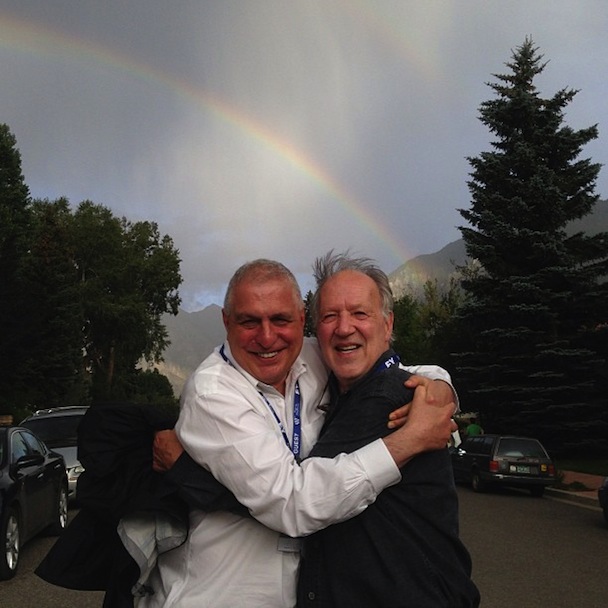 Morris on what documentary films should be:
Morris on what documentary films should be:
Every documentary film should be, in part, an investigation. If there’s an interview involved, you shouldn’t know what the person you’re interviewing is going to say. If you do, why bother? Josh Oppenheimer has now made two films – the Act of Killing, and the forthcoming Look of Silence. Companion films about victims and perpetrators. Investigations into the nature of history and the denial of history. I hope I’m doing the same. -EM
Morris on if he feels frustrated that people expected another Fog of War with his latest film:
Yes. You make a film with the secretary of defense you have, not with the secretary of defense you want to have. The Unknown Known – self-serving of me to say – is the best thing I’ve ever done. For someone like myself, who has made movies about self-deception, I can do no better. If some critics can’t see this, I guess all I can do is gnash my teeth and get fat. -EM
Morris on the effect his career has had on his life:
I’ve discovered that the world may be more profoundly stupid than I thought. This, I must confess, has had a depressing effect.-EM
Oppenheimer on if he expected the results:
The moment I expect the results I get, the filmmaking process is finished, or should be abandoned. The whole point is to journey into the unknown. – JO
Oppenheimer on why he thinks the international community has ignored these crimes:
Yes, convenience. Because some of the most powerful players in the international community – US, UK, Japan – are among the perpetrators of these crimes. – JO
Oppenheimer on his connection to those he filmed:
We made this film in collaboration with a network of genocide survivors and human rights activists. In fact, the project began as a film about survivors, not perpetrators: survivors asked me to make a film with them about why they are afraid – that is, a film about what it’s like for them to live with former death squad leaders all around them, still in positions of power — a film about what it’s like for them to live with the threat that this could happen again at any time. This was in early 2003, but the Army, which is stationed in every village in Indonesia, found out what we were doing and threatened the survivors not to participate in the film. The survivors urged me, “Before you give up and go home, try to film the perpetrators. They may tell you how they killed our relatives.” I did not know if it was safe to approach the killers, but when I did I found all of them to be boastful, immediately recounting the grizzly details of the killings, often with smiles on their faces, in front of their families, even their small grandchildren. In this contrast between survivors who forced into silence, and perpetrators boastfully recounting stories far more incriminating than anything the survivors could have told, I felt I’d wandered into Germany 40 years after the Holocaust, only to find the Nazis still in power.
When I showed this material back to those survivors who wanted to see it, and to the broader Indonesian human rights community, everybody said, more or less: “You are on to something terribly important. Keep filming the perpetrators, because anybody who sees this will be forced to acknowledge the rotten heart of the regime the killers have built.” From that point on, we felt entrusted by the survivors and human rights community to do a work that they could not safely do themselves: I spent two years filming every perpetrator I could find across North Sumatra, working from death squad to death squad up the chain of command, from the countryside to the city. Everybody was boastful, everybody would invite me to the places they killed, and launch into spontaneous demonstrations of how they killed. Throughout those two years, and throughout the subsequent filming of The Act of Killing, I was in constant dialogue and collaboration with the survivors and human rights community. Anwar Congo, the film’s main character, was the 41st perpetrator I filmed. – JO
Oppenheimer on how Anwar is today:
Anwar has lost his swagger, but is certainly not redeemed. If he were, he would have to become a spokesperson for human rights, and he has not had the courage to do that. He is as “okay” as a man like Anwar could ever be. But I’m not sure what that means. He and I remain in touch every 3-4 weeks, a bit more often these days. – JO
Oppenheimer on the ethics of filmmaking in The Act of Killing:
The shooting took place over 5 years, and from the beginning the filmmaking process was a dialogue between myself, survivors, the human rights community, and my wonderful Indonesian team. Our choices grew out of dialogue, and the commitment to the project was intense. Some of my crew changed careers to make this film, from being university professors and directors of human rights organisations, because they felt it was so important. Yes, we debated ethical issues along the way, like when they shake down the Chinese shopkeepers. My team said we must film it. I was reluctant because I did not want to become an accessory to the crime. I decided in the end to explain to the shopkeepers why we were there, and to pay each of them back afterwards. These sort of debates internal to the crew ensured that we were not replicating the violence and horror we were excavating. – JO
Oppenheimer on if he felt fear during filming and the reactions of those in the film:
First, thank you for your generous and kind remarks. I only really felt danger when the men in the film were questioning the process. For example, when the deputy minister of youth and sport is directing a re-enactment of a pogrom and calls CUT, saying this will be bad for his image. He had a contingent of the army standing by, and they would have arrested my crew at a moment’s notice. Luckily, however, he realised that he is a minister in the government because he is a feared gangster. If he cleans up his image too much, he’d be out of a job, so he changes his mind and decides to continue with the shooting.
The bigger fear was psychological. This was an intense 8 year journey into a very dark place with Anwar and his friends. Many of us in the crew had nightmares – for me they began when I filmed Anwar butchering the teddy bear, perhaps the most haunting scene in the longer director’s cut of the film. I feel I got through it because of the support and love I felt from my Anonymous crew.Herman has left Pancasila Youth as a result of the film, and now is one of the only people brave enough to screen the film publicly in Medan. That is, he supports the film.
Adi’s reaction – well, you see it in the film.The military and paramilitary organisation officially hate me, and that’s as it should be. I cannot return safely to Indonesia.
Anwar‘s reaction: when Anwar saw the film, he was very moved, tearful, and silent. After a while he said “This film shows what it is like to be me.” He and I remain in regular touch – a little more often than usual in the days leading up to the Oscars. I think we will always remain in touch, because although our relationship can’t really be called a friendship, we care for each other a great deal, and have been through an long, close and painful journey together. – JO
Herzog on the ending of the film:
Ultimately, truly powerful material invades into a movie. We as filmmakers just have to step aside and look on in amazement. -WH
Oppenheimer on how he decided his next project:
Werner told me my next project should be an Eddie Murphy comedy. Instead, I made a film about survivors of the 1965 genocide confronting the men who killed their son – coming soon. Errol told me that this IS an Eddie Murphy comedy. So I guess my approach is to do the opposite of what Werner advises, and dismiss Errol’s advice as bonkers. – JO
Morris on if he’d revisit Geins’ grave:
No. But Werner and I have talked about making a movie together. (I think we should do it.) -EM
The Act of Killing is now available everywhere.
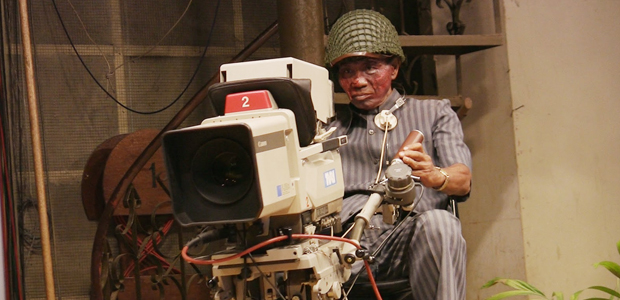
What were your favorite responses from the AMA?

